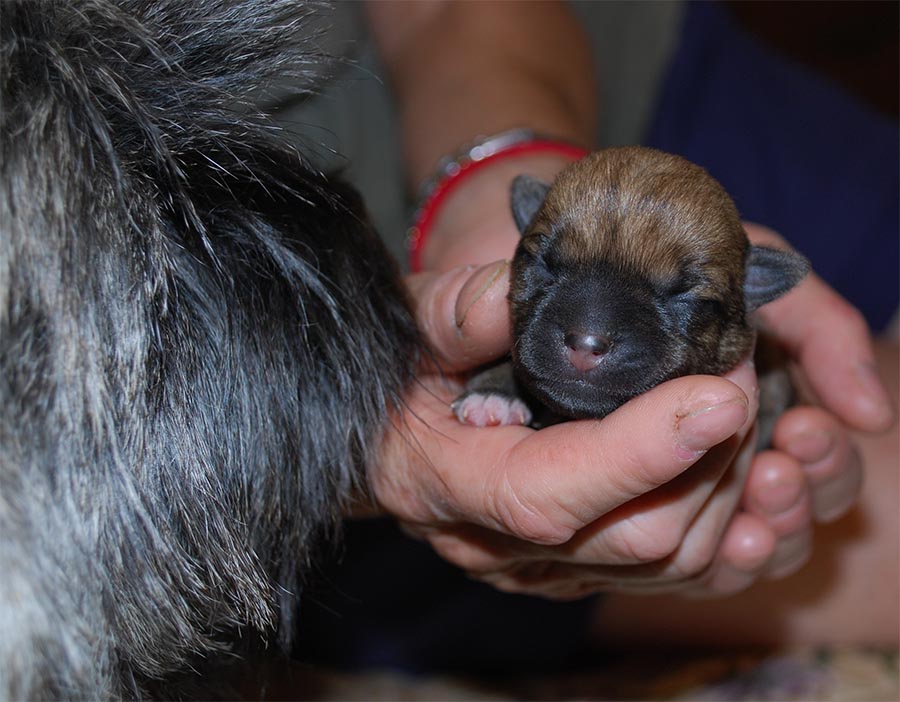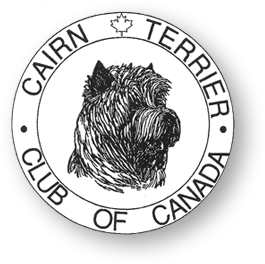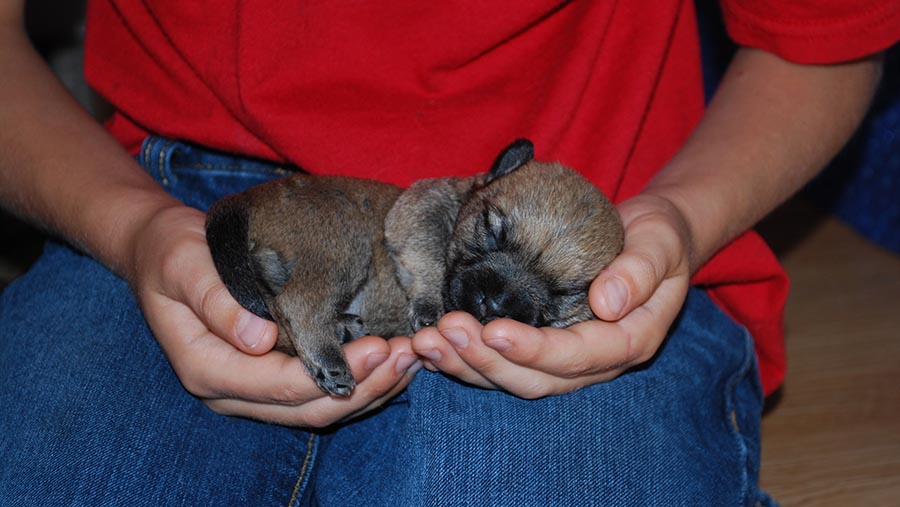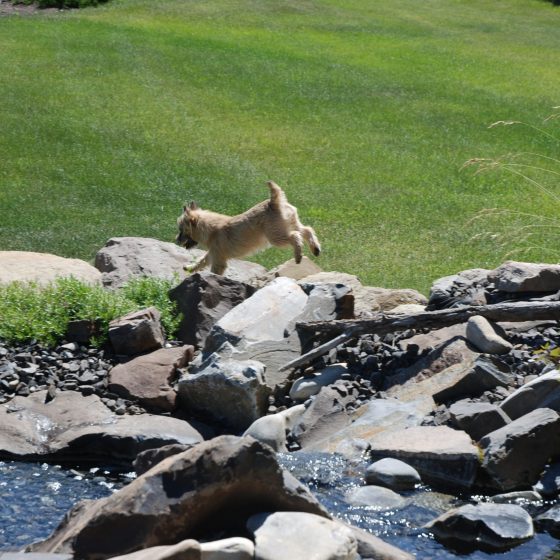Before proceeding to our breeder list (see button at bottom of the page), we encourage you to review the following information.
To ensure you get the best possible puppy for your family:
- Learn as much as you can about how the breeder raises puppies.
- Look for red flags indicating poor breeding practices and risk of poor quality puppies.
- Avoid impulse buys and quick decisions.
- Know the indicators of puppy scams.
How does a breeder get listed on this page?
The breeder must:
- Be a full member in good standing of the Cairn Terrier Club of Canada.
- Be a signatory to the Ethical Statement of the Cairn Terrier Club of Canada.
- Request a listing on the breeder page.
- As of January 2025, the Board of Directors has placed a moratorium on new breeder listings pending a review and update of our criteria.
What does this mean to you?
- Not all good breeders will be listed on this page. Some breeders, for various reasons, choose not to be listed.
- The CTCC does not certify or endorse breeders listed on the page. This page is an informational service only.
- It is your responsibility to make your own determination as to the quality of a breeder. Information provided below will help you in that process.

How do I find a breeder?
- The button at the bottom of the page will take you to a list of breeder-members of the CTCC.
- If you know someone who has a healthy, well tempered Cairn, ask for a referral - but do remember to do your homework for yourself and investigate the breeder thoroughly.
- Look for dog shows occurring in your area. Good sources for information about upcoming shows and performance events are: canuckdogs.com, dogshow.ca. and entryline.com. These sites allow you to search for events by location and dates. A week or so prior to a show, dogshow.ca will post a Judging Schedule on the event page, which will indicate the judging time and breed order for each group (Cairns are in the Terrier Group). Most breeders enjoy sharing their love and knowledge of the breed, but do be aware of possible time pressures (they may be busy preparing to enter the ring) and ask if they are free to have a conversation.
- Check the CKC puppy list. https://www.ckc.ca/Choosing-a-Dog/PuppyList/Default.aspx
How can I assess the quality of a breeder?
There are many different factors you may need to consider in choosing a breeder. You may not find a breeder that ticks every single one of your boxes, but if you find that there are multiple issues, it is worthwhile looking deeper or elsewhere.
Selection of parents
Your puppy’s potential is dependent on careful decision making about the sire and dam of the litter. Breeding is not simply a matter of having a girl and a boy and putting them together to make babies. Here are some of the things you might want to know about how the breeder selects the parents.
Health
Both sire and dam should be healthy and fit. Beyond this, there are breed specific genetic tests and physical assessments that should be done prior to breeding. For information on recommended health testing of breeding animals and puppies see out health guidelines here: https://www.cairnterrierclub.ca/club/ctcc-health-guidelines/
Don’t be taken in by statements like:
- “Our dogs are all health tested” – a blanket statement like this often simply means they took the dogs to a vet for a general exam - not that specific recommended health testing was done. Many conditions that would preclude breeding are not evident on a general vet exam. You need to know precisely what ‘health tested’ entails and to ensure that recommended tests are done.
- “Our dogs are tested for over 170 different genetic conditions” – Sounds impressive - but this is not a particularly meaningful statement! Most broad spectrum genetic tests look for a wide range of genetic mutations as well as physical characteristics. In reality, only a few genetic tests are relevant in a particular breed and a good breeder will focus specifically on those when discussing the health of their dogs. Furthermore, as there are health conditions in each breed that are not yet identifiable through genetic testing, additional testing such as eye examinations, physical examinations, blood tests, Xrays and echocardiograms etc. may be necessary to complete the health assessment.
- “We never have health issues in our puppies” – any breeder who has had more than a few litters will have health issues. Blanket statements like this are, at best, unhelpful and may indicate a failure to test and follow their puppies. Even if a breeder has been so fortunate as to have not had any serious health issues in their dogs, they know that it is always a possibility and past good fortune is not a guarantee of future freedom from health issues.
- "We have carefully bred health issues out of our lines" - a good breeder will always seek to breed away from health issues, but this statement, as a stand alone, suggests that a breeder is not making use of appropriate health testing and instead is relying on clinically apparent health issues as the means to exclude dogs from a breeding program. Some important health conditions do not reveal themselves until after a dog is done with their breeding career. Some genetic conditions may not be evident in parents who are carriers and only appear in offspring that get the gene from both parents. Careful breeding must still be supported by genetic testing for relevant conditions and physical testing for conditions not amenable to genetic testing.
- AN ASIDE about health testing: Health testing is important and should be taken seriously - but it is important to keep a proper perspective. No amount of testing can eliminate all future risk of health issues. Not all health issues are congenital or genetic. Many health issues are attributable to environment, infections, trauma and other exposures. Many congenital or genetic health issues cannot yet be reliably predicted through testing. Health 'guarantees' can only apply to conditions for which we have access to reliable, accurate tests. For this reason, some breeders will avoid the term 'health guarantee' and place that information under a different label. Regardless, when purchasing a puppy, the new owner should be clear about what the 'health guarantee' really means, precisely what testing has been done, and what conditions are or are not covered.
Pedigree
A pedigree is the dog’s family tree. On paper it simply looks like a list of names but to an informed breeder there is a wealth of information behind those names.
Registration
Both parents should be CKC +/- AKC registered. Foreign sires should be registered with the National Kennel Club in the country of origin. (NB: CKC = Canadian Kennel Club NOT Continental Kennel Club).
Championship
Parents will often, but not always, be champions or grand champions. Championship judging assesses the structure and temperament of dogs, providing independent assessments of how well the dog meets the breed standard. There is nothing wrong with breeding a dog that has not yet achieved Championship status, or is not being shown as there are sometimes good reasons why a dog that is a good representative of the breed cannot be shown. However, a breeder that never shows their dogs may be breeding inferior dogs and may not even be aware of faults in her own dogs.
Puppy Rearing Techniques
Experiences during the first 12 weeks of life significantly influence whether your puppy becomes a confident and resilient, or shy and fearful, adult. Many breeders work hard to ensure that their puppies experience a wide range of safe, positive, novel stimuli during this period. Some breeders will follow a structured program such as Puppy Culture www.puppyculture.com/ or Avidog, while others take a less structured approach. Either way, your breeder should be able to describe what she does to prepare her puppies for life in the real world. Dogs that are destined to be family pets should be raised in a home and family environment, not in a barn or commercial kennel type situation. From very early on, they need to be involved with the natural cadence of a household, hearing the sounds of daily life, experiencing normal diurnal rhythms, having frequent human interactions throughout each day and experiencing normal family activities.
Frequency of breeding / number of litters / puppies
There is no arbitrary optimal number of litters per year, or number of puppies produced that defines a good / ethical breeder vs. a poor / unethical breeder. However, breeding and puppy rearing is an intensive process. The greater the number of litters produced, the more likely it is that puppies are raised in a kennel type of setting (rather than in a home setting) and / or will lack the intensive habituation / socialization activities necessary for optimal development. Some excellent breeders raise more than one breed, but a breeder raising numerous different breeds and advertising puppies available on a continuous basis is unlikely to be able to provide the breed specific knowledge and intensive puppy rearing experiences you want.
Contracts / Purchase agreements
A good breeder will have a contact / purchase agreement that outlines a variety of key items including:
- The purchase price and return policies
- A health commitment specifying the breeder’s commitment to you if it becomes evident that your puppy is suffering from a health condition related to genetics or structure that significantly impairs its ability to be a household pet.
- A return clause: All good breeders will take steps to ensure their puppies never end up in shelters or rescues or are abandoned. Most will commit to taking the puppy back at any time, for any reason should you be unable to continue to care for the puppy.
- Spay / Neuter expectation specifying a requirement for spay / neuter and the recommended age of the procedure. Most puppies will be sold on Non Breeding Agreement (NBA) which means that you cannot register any offspring or sell them as a purebred dog. This is a legal requirement under the Animal Pedigree Act in Canada.
Red flags
- Continuously available puppies.
- Hard pressure sales tactics, rushing you for a quick decision.
- Extremely high or low purchase price (out of keeping with local norms). Disproportionately low prices suggest that the breeder is not performing recommended health testing (which by themselves can account for a substantial part of the total cost of a puppy) and is cutting corners with puppy rearing. When a price is disproportionately high, it is fair to ask the breeder what accounts for that.
- Advertising incorrect or unusual colours and / or unusual coat textures. Often these are considered reasons to charge more. Often these unusual features indicate that the puppy in question is not in fact a pure bred Cairn. (i.e. merle, white, or black and tan). Fluffy coat Cairns have an incorrect coat type but this is not an indication of mixed breeding. While very cute, this is not a reason to increase the price.
- Requesting deposit money or full payment by unconventional / unsecured methods.
- Deposits in and of themselves have no bearing on the quality of a breeder and are not a red flag. Some breeders use them, others do not. However, when a deposit is requested, failure to clearly articulate refund policies and procedures IS a red flag.
- Failure to provide legal contact information for the seller. Contact exclusively by social media.
- Be aware that there are many puppy scams – some of which entail taking deposits on puppies that do not exist, or taking more deposits than puppies and offering no or only partial refunds. Unscrupulous fake breeders often use screen grabs of litter photos to advertise their non-existent puppies. Ask for a face time or video of the puppies with date markers like a newspaper and do reverse image searches on Google images to see if pictures have been posted elsewhere.
- Unwilling to allow you to meet the dam / puppies before hand-off.
- Arranging puppy hand-offs in neutral locations. Parking lot transfers are a typical method used by dog brokers to quickly offload puppies. Once the puppy is handed off the seller is no longer unavailable to address any concerns or problems. The current climate of animal rights activism has caused some breeders to be cautious about allowing people access to their personal home and property, but once a trust relationship has been established they will work hard to make it possible for you to see the dam, the litter and individual puppies and will make their permanent contact details available to you. If the breeder is reluctant to invite you to their property work with them to find a safe neutral location.
- Puppies seem uncomfortable and unduly fearful when you visit. Not all puppies are social butterflies – but most Cairn puppies quickly warm up to people if you are calm and allow them to approach on their own terms. Puppies raised in barns / pens with little physical human contact may be persistently uncomfortable when brought out for 'display’.
- The breeder does not ask you a lot of questions! Good breeders care deeply about where their puppies go and will want to know a great deal about you before being willing to consider you as a potential puppy home. The breeder who does not ask questions is looking to unload a puppy, not place a puppy in a well matched home.
- The breeder is willing to place a puppy prior to 8 weeks. Many Cairn breeders prefer to place their puppies at around 10-12 weeks.
How to connect and communicate with a breeder
A good breeder will want to establish a relationship with you. You are a potential home for a loved and valued puppy in whom she has invested a great deal of time and energy. Here are some of the ways you might expect communications with a breeder to play out.
Before making contact
If the breeder has a website, review the information there, before your first contact, so you can ask specific questions and demonstrate that you have actually taken the time to explore the information provided.
Be sure you have done your homework and know as much as you can about the breed. Be prepared with specific questions.
Initial contact
Be aware that a casual contact “do you have puppies for sale?” or “how much are your puppies”, may or may not yield a response. Many breeders are inundated with casual requests. Tell the breeder a bit about your family and why you think a Cairn might be right for you so that the breeder feels that you are truly engaged in the process of looking for a puppy.
Questionnaires
Some breeders will have a questionnaire they want you to complete before considering you as a potential home. These may vary a great deal in length and specifics. Take these seriously and fill out the questions carefully, honestly and promptly.
Be prepared to wait and Stay in touch
If you are on a waiting list – don’t be afraid to periodically let the breeder know you are still out there and still looking for a puppy.
Deposits
Breeders differ in their approach to deposits: some take deposits while others don’t. Ask exactly what the deposit guarantees and the refund policies.
Getting your puppy
You should expect to pay in full before the puppy is transferred to your care. The breeder should spend time with you going over the details of the purchase agreement details as well as the puppy’s health record including vet examination(s), testing results, deworming, and vaccinations (what and when given, when next due) and answering any questions you might have. In all likelihood the breeder will also discuss a great deal of other information with you. Registration papers for the puppy will generally not be available at the time you pick the puppy up. The regulations regarding registration papers stipulate that you must receive them within 6 months of taking possession of the puppy, along with a copy of the pedigree. Some breeders will defer registration until you have had the puppy for several weeks to ensure that all is going well.
Should I consider for a rescue or rehomed Cairn?
Rehomed Cairns
Dogs are rehomed for a variety of reasons. Changing circumstances of the owner, such as death, disability, financial concerns or relocations are common reasons for rehoming. Breeders may rehome retired show or breeding dogs so these dogs can have the joy of having a home where they are a ‘one and only’ companion rather than being one of a group. These dogs are typically well loved, cared for, trained and socialized.
Rescue Cairns
These are dogs that are often surrendered or removed from poor conditions (puppy mills, hoarding situations etc) or abandoned / stray dogs. Many are not purebred Cairns but may be Cairn mixes. You will have less information available to you as to past health issues, and temperament and getting a rescue does have a greater risk that you may end up with a dog that requires significant unanticipated financial resources, time and effort to address health and temperament issues. Rescue Cairns can be especially rewarding if you are prepared to put in the work needed to help these precious dogs. For families with young children, keep in mind that rescues often come with unknown baggage and you should take your time to assess how the dog interacts with children. If you have any concerns, even small ones, it might be best to pass and continue your search. Even if all looks good, you will have to be extra cautious in the early days to curate interactions between children and dog. Keep in mind that it can take 3 months or more for a rescued Cairn that has been stressed, either by their prior living situation or the circumstances that brought them into rescue, to begin to truly settle into a new home. So be patient, get expert help in necessary and go slow, allowing the dog to set the pace.
How can I locate a rescued or rehomed Cairn?
- Contact breeders to see if they have any Cairns that they may be planning to retire.
- Breed rescue: Many breed specific rescues are not ‘bricks and mortar’ operations but operate as a volunteer network, on an as needed basis. When a Cairn is in need of rescue, the network will jump into action to obtain, transport and foster the dog, usually with a breeder or other experienced Cairn owner until a new home is found. This fostering time is very important as it will provide a ‘decompression’ period and allow the fosters to assess and intervene for health and temperament issues and, match the dog with a home that will be able to provide the best environment for the dog.
- The CTCC Rescue network has regional representatives. Contact information can be found under the Rescue Contacts button. Be aware that the availability of rescue Cairns is limited - the frequency with which Cairns become available through rescue is low. If you are open to a rescue, be in touch with our rescue coordinators but be prepared to wait.





